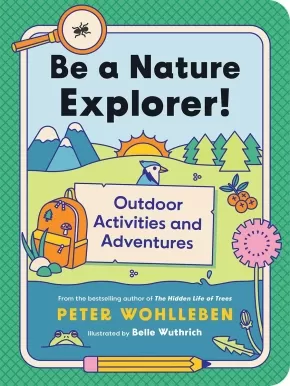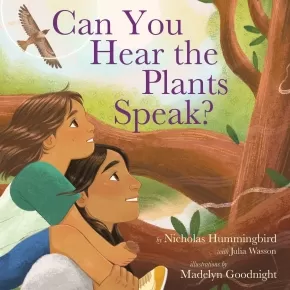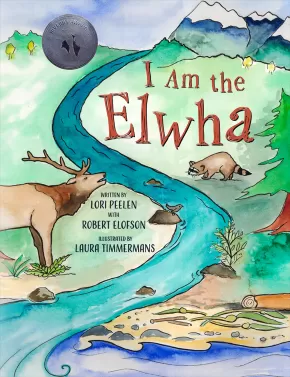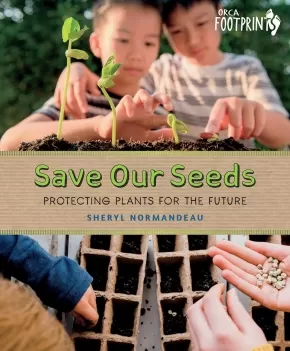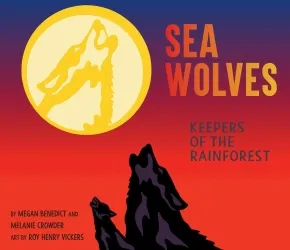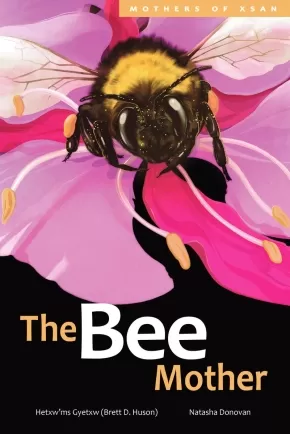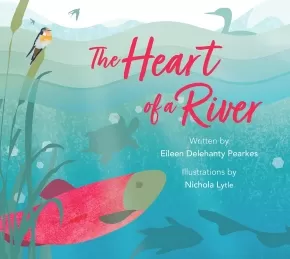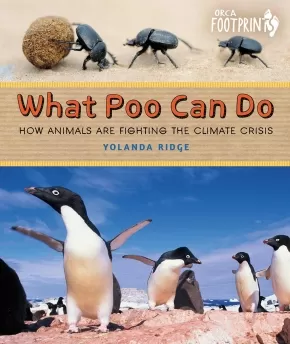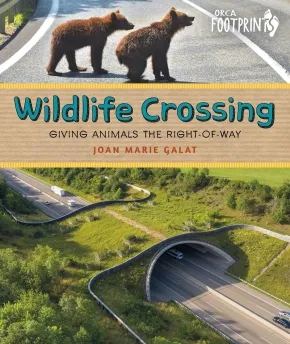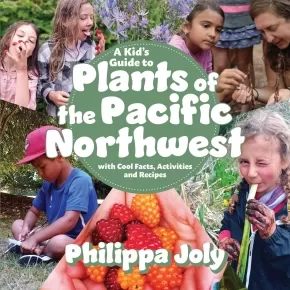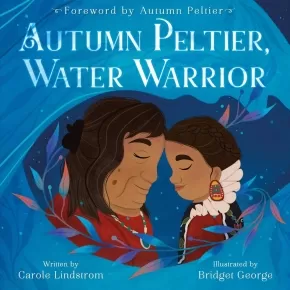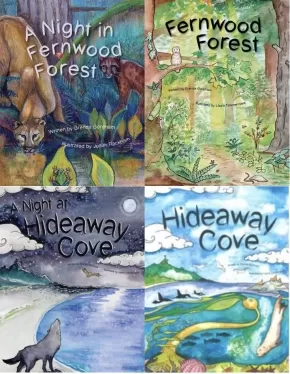
Environment
16
-
30
of
188 Results;
Sort By
Go To
of 13
Be a Nature Explorer!: Outdoor Activities and Adventures
$17.95
Artists:
Format:
Paperback
ISBN / Barcode: 9781771649698
Synopsis:
Synopsis:
For kids ages 6 to 10, this nature activity guide is the perfect companion for every child’s next outdoor adventure, from the New York Times bestselling author of The Hidden Life of Trees and Can You Hear the Trees Talking?
An excellent resource for parents, teachers, and curriculums ranging from outdoor education to homeschool and forest school.
Whether you are in the forest, in your own backyard, or in the city, there are so many exciting ways to engage with nature—and forester Peter Wohlleben has the best ideas for doing so. With Be A Nature Explorer!, kids will learn how to press flowers, harvest algae, skip stones, observe spiders, and even how to build their own tiny sailboat.
This ultimate kids' nature book features:
- 52 short, fun, and hands-on activities to help kids explore and discover the outdoors—one for each week of the year.
- Portable format: This lightweight paperback is designed to easily throw in a backpack and refer to on adventures.
- STEM learning and outdoor skill development: Kids will learn how to decode nature’s messages, identify plants and animal tracks, record and preserve their finds, and more.
Packed with activities that will fill kids with wonder and confidence in the outdoors, readers will be dipping in and out of Be A Nature Explorer! all year round.
Educator Information
Recommended for ages 6 to 10.
Curriculum Connections: Nature and the Environment, Outdoor Learning
Published in partnership with the David Suzuki Institute.
Additional Information
100 pages | 6.00" x 8.00" | Paperback
Can You Hear the Plants Speak?
$24.99
Artists:
Format:
Hardcover
Text Content Territories:
Indigenous American; Native American; Apache; Cahuilla;
ISBN / Barcode: 9780063221284
Synopsis:
Synopsis:
Our people believe spirit lives in everything.
Mountain, river, wind, tree.
Come, take a walk with me.
What do we learn from plants when we listen to them speaking? Indigenous plantsman Nicholas Hummingbird calls on the legacy of his great-grandparents to remember how one drop of rain, one seed, one plant can renew a cycle of hope and connection—for him and for each of us.
Perfect for readers of Sy Montgomery, debut authors Nicholas Hummingbird and Julia Wasson joyfully proclaim even the youngest person can be an earth protector. With gorgeous illustrations from Rock Your Mocs artist Madelyn Goodnight, Can You Hear the Plants Speak? encourages us to engage with the natural world.
Educator Information
Recommended for ages 4 to 8.
Additional Information
40 pages | 10.00" x 10.00" | Hardcover
Get Outside!: How Humans Connect with Nature
$21.95
Format:
Hardcover
ISBN / Barcode: 9781459836877
Synopsis:
Synopsis:
We know spending time in nature is good for us, but why? And how did people become so disconnected from the natural world, anyway?
Get Outside! How Humans Connect with Nature explores the important relationship between people and nature. It asks big questions, like Are humans part of nature or separate from it? and Do all people have equal access to nature? By discussing global issues such as the climate crisis and environmental racism, the book shows us that, by strengthening our relationship with the natural world, we can learn how to take care of the environment and to let the environment take care of us too.
Reviews
“Payne argues that humans are part of nature and should be engaging with the natural world more often and more effectively…Informative and likely to spur readers to forge a stronger bond with the natural world.”— Kirkus Reviews
“The text is visually striking…This book should appeal to readers interested in or curious about the outdoors and could lead to deeper engagement or activism.”— School Library Journal (SLJ)
Educator & Series Information
Recommended for ages 9 to 12.
This book is part of the Orca Footprint series.
Reading Levels:
Fountas & Pinnell Text Level Gradient: X
Lexile measure: 1030L
Guided Reading Level: X
Additional Information
48 pages | 8.00" x 9.50" | Includes 49 colour photographs, 1 index, 1 bibliography | Hardcover
I Am the Elwha (PB)
 $14.95
$14.95

Artists:
Format:
Paperback
Text Content Territories:
Indigenous American; Native American; Salish; Coast Salish; Klallam (Clallam); Lower Elwha Klallam Tribe;
ISBN / Barcode: 9781771746311
Synopsis:
Synopsis:
"I am the Elwha, rushing down to the sea. I am the Elwha, wild and free."
The Elwha River flows 72km (45 miles) from its source in the Olympic Mountains to the Strait of Juan de Fuca in the Pacific Northwest. Uniquely, it hosts all six salmon species (Pink, Chinook, Coho, Sockeye, Steelhead, and Chum) as well as several species of trout.
In 1911, two dams were built on the river. The dams blocked the migration routes of the salmon and dramatically altered the entire river ecosystem for 100 years. In 2012, the dams were decommissioned and the world's largest dam removal and habitat restoration project began. In this lyrical and beautifully illustrated book, the author chronicles the history of the Elwha.
Narrated by the powerful voices of plants and animals that inhabit the river ecosystem, the dam builder, a worker, members of the Klallam Tribe, and the river itself, this story celebrates the ongoing rewilding of this special environment and offers a welcome to all the creatures who are coming home.
To learn more visit: www.elwha.org
Awards
- 2021 Riverby Award for Young Readers
Reviews
“I Am the Elwha is a powerful read about a powerful river and those who value and protect it." – Raina Delisle, Hakai Magazine
Educator Information
Recommended for grades 3 to 7.
At the back of the book are three pages of cultural, scientific, and historical information that discuss the following:
- the importance and symbolism of salmon to the Lower Elwha Klallam Tribe and other Coastal Salish Tribes
- facts about the six species of salmon found in the Elwha River (Chinook, Pink, Chum, Sockeye, Coho, and Steelhead)
- the history of the Elwha River and its status today
Keywords / Subjects: The Elwha River, Rivers, Dams, History, Environmental Awareness, Lower Elwha Klallam Tribe, Coast Salish, Native American, Culture, Washington, Animals, Salmon, First Salmon Ceremony, Plants, Nature, Settlers, Social Responsibility, Environmental Activism, Poetry.
Additional Information
32 Pages | 8.5" x 11" | ISBN: 9781771746311 | Second Edition | Paperback
Authenticity Note: This lyrical story, which chronicles the history of the Elwha River, is written by Lori Peelen. Robert Elofson, Tribal Elder and Harvest Manager in the Natural Resources Department for the Lower Elwha Klallam Tribes, approved Lori's work and contributed pages of back matter at the end of the work. Lori's story was further approved by Frances Charles, the Tribal Councilwoman for the Lower Elwha Klallam Tribe, after the entire council read and approved it.
The Canadian Content label has been applied because the illustrator of this work is Canadian.
It Is Good to Live in Beautiful Arctic Bay
$16.95
Artists:
Format:
Paperback
Text Content Territories:
Indigenous Canadian; Inuit;
Grade Levels: Preschool; Kindergarten;
ISBN / Barcode: 9781774507933
Synopsis:
Synopsis:
Lucy loves living in Arctic Bay. There are so many things to do in each season! In the winter during "the great darkness," Lucy likes watching the northern lights. She is always excited to welcome the sun back in the spring. In the summer, Lucy can't wait to go blueberry picking, camping, and eat pissi. Follow along with Lucy as she takes readers through the seasons and shares all her favourite things about living in beautiful Arctic Bay.
Educator & Series Information
Recommended for ages 3 to 5.
Dual-Language: English and Inuktitut.
This book is part of the Community Connections series.
Additional Information
29 pages | 9.00" x 8.00" | Paperback
Save Our Seeds: Protecting Plants for the Future
$21.95
Format:
Hardcover
ISBN / Barcode: 9781459836976
Synopsis:
Synopsis:
Small but mighty. Learn about the importance of seeds and how saving and conserving them for the future is key to sustaining healthy life on the planet.
Seeds are essential to all life on the planet. They provide us with food, clothing and other materials we need and use every day. Without seeds, the planet wouldn't have as many species of plants as we do now. Without plants, there wouldn't be oxygen to breathe and there would be less food for all life on Earth. But today seeds are under threat, mostly from human activity. The climate crisis and food insecurity mean protecting our seeds is more important than ever. In Save Our Seeds, young readers will hear from experts in the field and learn how to take action to preserve seeds for the future.
Reviews
“The latest volume in the well-regarded Orca Footprints series presents a broad array of information about seeds…Exploring seeds more broadly than most children’s books on the topic, this volume encourages readers to collect, plant, and share seeds—a small, yet powerful resource.”- Booklist
“Author and master gardener Sheryl Normandeau… emphasizes the importance of saving and conserving seeds for the future in order to sustain healthy life on Earth. Highly Recommended.”- CM: Canadian Review of Materials
Educator & Series Information
Recommended for ages 9 to 12.
This book is part of the Orca Footprint series.
Reading Levels:
Fountas & Pinnell Text Level Gradient: X
Lexile measure: 1040L
Guided Reading Level: X
Additional Information
48 pages | 8.00" x 9.50" | Includes 60 colour photographs, 1 index, 1 bibliography | Hardcover
Sea Wolves: Keepers of the Rainforest
$24.99
Format:
Hardcover
Text Content Territories:
Indigenous American; Indigenous Canadian;
ISBN / Barcode: 9781662620119
Synopsis:
Synopsis:
This lyrical, stunningly illustrated book explores the sea wolf—an apex marine mammal evolved from the gray wolf—as it navigates the coastline, eats seafood, and lives its extraordinary, unusual life.
Sea Wolves: Keepers of the Rainforest is the astonishing story of a wolf species that calls the shores of western Canada and southeastern Alaska home. Here, wolves crack clams, feast on fish roe, swipe salmon from rivers, and swim miles between islands—as long observed by the First Nations communities that have lived alongside them for thousands of years.
However, with the rise of industrial logging, pipeline projects, and other threats, sea wolves face a troubled future. Wildlife experts and First Nations members agree: these majestic creatures are a vital part of the ecosystem and need to be protected.
Through beautiful verse and striking illustrations, Sea Wolves captures the fascinating life of an animal with great cultural and scientific significance—one that will inspire awe in young readers.
Educator Information
Recommended for ages 4 to 8.
Story Locale: Coast of western Canada and southeastern Alaska; British Columbia; First Nations territory
Additional Information
32 pages | 11.31" x 9.81" | Hardcover
The Bee Mother
$24.95
Artists:
Format:
Hardcover
Text Content Territories:
Indigenous Canadian; First Nations; Gitxsan (Gitksan);
ISBN / Barcode: 9781774920800
Synopsis:
Synopsis:
Discover the important role of bumblebees, honeybees, and wasps as pollinators in this colourful picture book for young scientists.
Learn about the life cycles of different kinds of bees in this enlightening picture book.
As flowers and trees begin to bud and bloom, Nox Ap, the bee mother, emerges from her winter sleep. To the Gitxsan, she is nature’s gardener. Without her hard work as a pollinator, we could not enjoy the fruits of strawberries and huckleberries. Follow her life from the first thaw of spring to the end of autumn.
In the seventh book of Hetxw'ms Gyetxw (Brett D. Huson)’s Mothers of Xsan series, readers will discover the important role of the bumblebee, the honeybee, and the yellow jacket wasp in the Xsan ecosystem.
Reviews
“Described with delicious adjectives (“pillowy moss floor”) that enrich the story...lushly colored and detailed; the fur on the bumblebee looks ready to be brushed. This great blend of nonfiction with narrative and amazing illustrations will engage readers in the life of bees and their significance to the Gitxsan Nation. A solid general purchase.” — School Library Journal
Educator & Series Information
Recommended for ages 9 to 12.
This book is part of the Mother of Xsan series, which uses striking illustration and lyrical language to bring the poetry of the Xsan ecosystem to life. It is the seventh book in the series.
Reading Level: Fountas & Pinnell T
Lexile® Framework for Reading: 1140L
Recommended in the Indigenous Books for Schools catalogue as a valuable resource for English Language Arts and Science in grades 2 to 6.
Themes: Animals, Land, Language, Sustainability, Life Cycles, Biodiversity, Interdependence, Seasons
Additional Information
32 pages | 6.50" x 10.00" | Hardcover
The Heart of a River
$18.00
Artists:
Format:
Paperback
Text Content Territories:
Indigenous American; Native American; Salish; Interior Salish; Sinixt; Indigenous Canadian; First Nations; Salish; Interior Salish; Sinixt;
ISBN / Barcode: 9781771607001
Synopsis:
Synopsis:
This is a book for anyone, of any age, who cares about rivers.
This story of the Columbia River is unique. Told from the river’s perspective, it is an immersive, empathetic portrait of a once-wild river and of the Sinixt, a First People who lived on the mainstem of this great western river for thousands of years and continue to do so even though Canada declared them “extinct” in 1956.
The book’s re-release comes at a critical time for natural systems and for reconciliation with Indigenous Peoples across North America. The Colville Confederated Tribes, representing over 3,000 Sinixt People, recently won a precedent-setting case in the Supreme Court of Canada affirming that Aboriginal Rights do not stop at the border. The important story of the Sinixt weaves together with the ongoing ecological impact of hydropower development on the Columbia and its tributaries.
Central to the story is the joyous spirit of salmon, once a free swimmer in the Columbia’s currents north of the border but now blocked from ancestral spawning grounds by Grand Coulee and other dams. Restoring migratory fish indigenous to the Upper Columbia will require transboundary cooperation. With Indigenous Nations on both sides of the US–Canada border now leading the way, many are hopeful that the fish will return.
Lavishly illustrated by Nelson, BC, designer Nichola Lytle, this portrait of a globally significant river will inspire anyone who reads it to care about the future of the salmon, a fish that unites all of us in its quest for freedom and possibility.
Educator Information
Recommended for ages 4 to 8.
Additional Information
96 pages | 9.50" x 8.50" | Paperback
Walking Together (PB)
$12.99
Format:
Paperback
Text Content Territories:
Indigenous Canadian; First Nations; Mi'kmaq;
ISBN / Barcode: 9781773217772
Synopsis:
Synopsis:
This bestselling, innovative picture book introduces readers to the concept of Etuaptmumk—or Two-Eyed Seeing, the gift of multiple perspectives in the Mi’kmaw language—as we follow a group of young children connecting to nature as their teacher.
A poetic, joyful celebration of the Lands and Waters as spring unfolds: we watch for Robin's return, listen for Frog's croaking, and wonder at maple tree's gift of sap. Grounded in Etuaptmumk, also known as Two-Eyed Seeing—which braids together the strengths of Indigenous and non-Indigenous ways of knowing—and the Mi’kmaq concept of Netukulimk—meaning to protect Mother Earth for the ancestors, present, and future generations—Walking Together nurtures respectful, reciprocal, responsible relationships with the Land and Water, plant-life, animals and other-than-human beings for the benefit of all.
Reviews
"Walking Together is a poetic celebration grounded in Etuaptmumk (Two-Eyed Seeing) that weaves together the strengths of Indigenous and non-Indigenous ways of knowing. The story explores respectful, reciprocal, responsible relationships between the land, water, plants, animals, and humans." - The Dalai Lama Center
Educator Information
Recommended for ages 4 to 7.
Introduces the concept of Two-Eyed Seeing (the gift of multiple perspectives) to young readers.
This book is available in a bilingual format: Walking Together / Menaqaj Pemwije’tulti’k
Additional Information
36 pages | 8.90" x 8.90" | Paperback
What Poo Can Do: How Animals Are Fighting the Climate Crisis
$21.95
Format:
Hardcover
ISBN / Barcode: 9781459835412
Synopsis:
Synopsis:
We all know animals are affected by the climate crisis. But did you know the climate crisis is also affected by animals?
From whales to dung beetles, What Poo Can Do explores how animals big and small are helping the planet every time they do a number two. Come on a journey to different parts of the world to see how animals are fertilizing plants, storing carbon, preventing fires, reducing methane and even creating color-coded maps—all through their feces! Readers will discover how animal defecation makes a difference when it comes to the climate crisis. It's time to embrace the power of poo!
Reviews
“Well-organized and sustains the reader’s interest…Highly recommended.”— CM: Canadian Review of Materials
“While most environmental titles for children focus on how humans can protect and care for the planet, this book focuses on animals who are already assisting the cause—with poop!”— Booklist
Educator & Series Information
Recommended for ages 9 to 12.
This book is part of the Orca Footprint series.
Reading Levels:
Fountas & Pinnell Text Level Gradient: X
Lexile measure: 1090L
Guided Reading Level: X
Big Ideas & Themes: Environmental Awareness, Climate Change, Environmental Conservation & Protection, Green Issues, Sustainability, Wildlife
Additional Information
48 pages | 8.00" x 9.50" | Includes 41 colour photographs, 1 diagram, 1 index, 1 bibliography | Hardcover
Wildlife Crossing: Giving Animals the Right-of-Way
$21.95
Format:
Hardcover
ISBN / Barcode: 9781459833463
Synopsis:
Synopsis:
What happens when the needs of people and nature collide?
More than 13 million miles of roads crisscross landscapes in 222 countries. Roads offer many human benefits, but they also create problems for nature. Their construction leads to a loss of biodiversity through habitat loss, fragmentation and degradation. Roads isolate wildlife populations, impede migration and allow invasive plant and animal species to spread, while giving rise to pollution from garbage, light, noise and airborne contaminants. With innovative tools, like wildlife overpasses to reconnect landscapes, smart roads and vehicles to maximize safety, and a little hands on help, we can create environmental harmony. And sitting in the passenger seat, young people can play a part in helping highways and habitats coexist.
Reviews
“Well organized and includes clearly explained examples from many locations…This volume offers considerably more information for students researching the topic. An intriguing subject and a good resource for middle-grade reports.”— Booklist
“Gorgeous, crisp photographs complement the well-written text…A first purchase for libraries that need more books on the topic of conservation and the impact of development on wildlife.” — School Library Journal (SLJ)
“A fascinating, invaluable and enlightening tool for libraries, schools and homes alike. Wildlife Crossing will empower all readers to do their part when it comes to road ecology and will undoubtedly spark meaningful conversations about what it means to coexist with nature. Very highly recommended.”— Canadian Children's Book Centre (CCBC) Canadian Children’s Book News
“Wildlife Crossing gives an intriguing overview of the topic in just 48 pages, but it is a good addition to science collections with a focus on the environment. Highly Recommended.”— CM: Canadian Review of Materials
Educator & Series Information
Recommended for ages 9 to 12.
This book is part of the Orca Footprint series.
Reading Levels:
Fountas & Pinnell Text Level Gradient: X
Lexile measure: 1130L
Guided Reading Level: X
Additional Information
48 pages | 8.00" x 9.50" | Includes 74 colour photographs, 1 index, 1 bibliography | Hardcover
A Kid's Guide to Plants of the Pacific Northwest: with Cool Facts, Activities and Recipes
$26.95
Format:
Paperback
Text Content Territories:
Indigenous American; Alaska Native; Native American; Indigenous Canadian; First Nations;
ISBN / Barcode: 9781990776212
Synopsis:
Synopsis:
A middle-grade-friendly introduction to Pacific Northwest flora, with outdoor activities, games and quizzes that make learning about nature fun! Great for families and educators.
Get dirty digging up roots. Crouch down to look closely at a carnivorous sundew dissolving a dragonfly. Munch some lemony-tasting miner’s lettuce. Go on a scavenger hunt for some of nature’s more surprising creations, like the arbutus tree, a sculpture of living copper. Make a soothing plantain salve to treat an itch. Learn which berries you can eat and which to avoid.
Time spent outdoors encourages children’s self-confidence and independence, increases attention span and physical well-being, and fosters care for the environment. With the increasing intrusion of technology into daily life, and the challenges of climate chaos, it has never been more essential for parents and educators to encourage kids to engage with the natural environment. Plants are everywhere, even in urban areas where parks, empty lots and backyards offer the opportunity to learn from and connect to nature.
Drawing on her years of experience as a herbalist and outdoor educator, author Philippa Joly features more than fifty richly illustrated plant profiles, including information on identification and ecology, uses in Coastal Indigenous cultures, and fun activities—all in a way that is accessible and interesting to readers of all ages.
Reviews
“This is an absolutely delightful book, dedicated to helping children and youth build relationships with the plants in their world. It is a rich compendium of plant portraits and descriptions, personal stories, recipes, games and hands-on activities—like making tea from Yerba Buena or making a root-digging stick of Oceanspray. Philippa’s obvious love of kids, plants and the natural world shines through—and it is catching!” — Nancy Turner, Professor Emeritus, University of Victoria, and author of Plants of Haida Gwaii
Educator Information
Recommended for ages 6 to 12.
Table of Contents
1. Indigenous Peoples of the Pacific Northwest Coast
2. Regions and Plants Covered by This Book
3. Plant Names and Language
4. Dos and Dont's of Wildcrafting Plants
5. Understanding Plant Families
6. Plant Guilds
7. Poisonous Plants
8. Invasive Plants
9. Plant Profiles
10. For Parents and Educators
Additional Information
232 pages | 8.50" x 8.50" | Paperback
Autumn Peltier, Water Warrior
$24.99
Format:
Hardcover
Text Content Territories:
Indigenous Canadian; First Nations; Anishinaabeg; Wiikwemkoong Unceded Territory;
ISBN / Barcode: 9781250795274
Synopsis:
Synopsis:
From New York Times bestselling picture book author Carole Lindstrom and illustrator Bridget George comes Autumn Peltier, Water Warrior, an inspiring picture book biography about two Indigenous Rights Activists, Josephine Mandamin and Autumn Peltier.
The seventh generation is creating
A sea of change.
It was a soft voice, at first.
Like a ripple.
But with practice it grew louder.
Indigenous women have always worked tirelessly to protect our water—keeping it pure and clean for the generations to come. Yet there was a time when their voices and teachings were nearly drowned out, leaving entire communities and environments in danger and without clean water.
But then came Grandma Josephine and her great-niece, Autumn Peltier.
Featuring a foreword from water advocate and Indigenous Rights Activist Autumn Peltier herself, this stunning picture book from New York Times-bestselling author Carole Lindstrom and illustrator Bridget George gives voice to the water and asks young readers to join the tidal wave of change.
Educator Information
Recommended for ages 4 to 8.
Additional Information
40 pages | 10.45" x 10.30" | Hardcover
By Day and By Night Nature Series Bundle
 $72.32 $80.35
$72.32 $80.35

ISBN / Barcode: 9781771746014
Synopsis:
Synopsis:
This bundle includes all four titles in the By Day and By Night Nature Series:
- Hideaway Cove (hardcover)
- A Night at Hideaway Cove (paperback)
- Fernwood Forest (hardcover)
- A Night in Fernwood Forest (hardcover)
Each book in the By Day and By Night Nature Series focuses on a scene typical of a distinct west coast habitat, showing how living and non-living things are connected in a healthy ecosystem. As readers, we observe animals going about their daily activities: caring for their young, searching for food, and responding to the changes in light, temperature, and weather conditions throughout the day or night. The last four pages of each book provide facts about the highlighted animals and plants as well as features that are unique to their habitats. The final page suggests ways that young readers and their families can be respectful as they visit wilderness areas.
Readers with a sense of curiosity will find opportunities in these books to:
- use picture clues to predict the featured animal on the next page
- identify, count, and sequence numbers (1 owl, 2 deer, 3 squirrels, etc.)
- search for small creatures that travel from page to page
- discover patterns in the text and structure of the books
- track the movement of the sun, or moon, across the sky
Reading Level: Nonfiction text features such as headings, bold words, bullets, captions, and labelled diagrams make these books accessible to independent readers in grades 2 to 4. The books would also be great “read-alouds” for younger children.
Curriculum Links
Reading - Providing opportunities for guided practise in using reading strategies: visualizing, making connections, asking questions, transforming, and inferring.
Science - Supporting discussion and further exploration:
- characteristics of living things
- needs of living things
- connections between living and non-living things
- daily and seasonal changes
- animal growth and changes
- plant growth and changes
- weather
- habitats
- observable patterns in the sky
Numeracy - Counting and sequencing of numbers 1 to 10.
Social Responsibility - Initiating discussions about ways to take care of wilderness areas.
Lesson plans are available for each book and are free to download from each book's listing on our website!
Additional Information
Titles included are 32 pages, 8.5" x 11"
Please note: All books in this bundle are hardcovers, except for A Night at Hideaway Cove, which is a paperback as the hardcover edition is out of print.
Sort By
Go To
of 13

